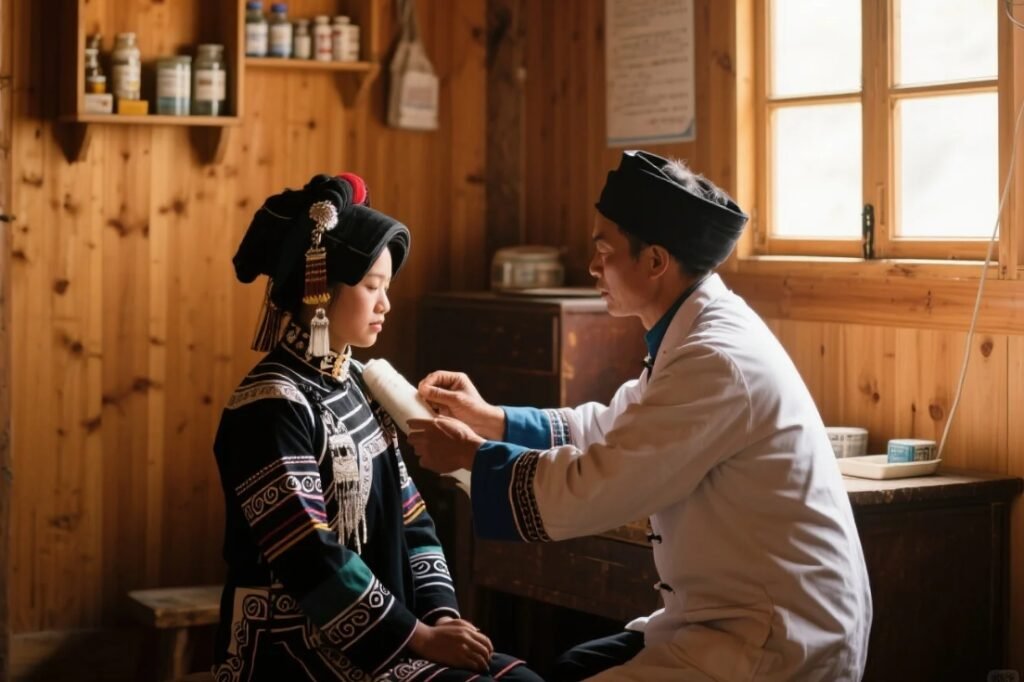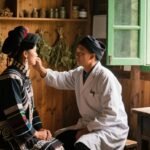Mongninggong (Sore Throat)
Overview In Miao medicine, sore throat is referred to as Mongninggong, characterized mainly by swelling and pain in the throat.
In Traditional Chinese Medicine (TCM), sore throat falls under the category of “throat obstruction” (hou bi). Symptoms include dry, painful throat and discomfort due to swelling. It is classified into wind-heat throat obstruction, wind-cold throat obstruction, and deficiency fire throat obstruction.
From a Western medicine perspective, sore throat is primarily caused by pharyngeal diseases, most commonly pharyngitis. It may also be a manifestation of conditions in adjacent organs or systemic diseases. Pain can be stabbing, dull, burning, distending, or throbbing, and may be intermittent or persistent depending on the nature of the illness and the patient’s pain sensitivity. Both acute and chronic pharyngitis can be treated with reference to this condition.
Miao Medicine Classification This condition is classified as a minor illness in Miao medicine, further divided into heat meridian pharyngitis and cold meridian pharyngitis.
Causes This illness is mainly caused by wind, heat, and damp toxins or recurrent colds in individuals with weak constitutions.
Pathogenesis Wind, heat, and damp toxins invade through the mouth and nose, first attacking the throat. Heat pathogens damage the blood and fluids, leading to dryness and pain in the throat.

Diagnosis
Diagnostic Criteria
Dryness and pain in the throat, with worsening discomfort and difficulty swallowing, possibly accompanied by systemic symptoms.
History of exposure to wind-cold or wind-heat pathogens, or chronic unresolved illness.
Relevant Examinations
Pharyngeal examination: mucosal congestion, swelling, or granular protrusions in the throat, possibly coalescing into plaques.
Differential Diagnosis Gangdu (Tonsillitis) Both conditions manifest as throat pain. Gangdu presents with severe pain radiating to the ears, worsened by swallowing, often accompanied by high fever, chills, and loss of appetite. Chronic Gangdu features persistent sore throat and a sensation of foreign body in the throat. Mongninggong pain tends to be milder and characterized by dryness, swelling, and discomfort, usually without a foreign body sensation.
Syndrome Differentiation and Treatment
Heat Meridian Pharyngitis
Symptoms: Fever, aversion to wind, headache, cough, redness and swelling in the throat, pain, difficulty swallowing, severe cases may involve high fever, nausea, headache, scanty yellow urine, and constipation.
Meridian Affiliation: Heat meridian syndrome.
Treatment Principles: Qingre Jiedu (clear heat and detoxify).
Prescription:
Jiangcan (Gangye) 6g
Bohe (Wokeou) 8g
Caoshanhu (Doulioque) 15g
Decoction.
Jiangcan: Warm and salty, warm-meridian herb, tonifies qi and blood, expels toxins.
Bohe: Cold and spicy, cold-meridian herb, disperses wind-heat and clears the throat.
Caoshanhu: Cold and bitter, cold-meridian herb, clears heat, detoxifies, relaxes the throat, and reduces swelling.
Cold Meridian Pharyngitis
Symptoms: Dryness and foreign body sensation in the throat, mild swelling and pain, nausea, cough with clear sputum.
Meridian Affiliation: Cold meridian syndrome.
Treatment Principles: Ziyin Jianghuo (nourish yin and reduce fire), Qingfei Zhikou (clear lung and relieve cough).
Prescription:
Baihuasheshecao (Wuchonggang) 18g
Jingualan (Baojiaosang) 15g
Pipaye (Banglati) 10g
Chuanxinlian (Jiangangdawu) 10g
Decoction.
Baihuasheshecao: Neutral and mildly sweet, dual-meridian herb, clears heat, detoxifies, drains dampness, and reduces swelling.
Jingualan: Cold and bitter, cold-meridian herb, clears heat and benefits the throat.
Pipaye: Cold and bitter, cold-meridian herb, clears heat, drains dampness, activates blood, and reduces swelling.
Chuanxinlian: Cold and bitter, cold-meridian herb, clears deficiency heat and tonifies qi.
Prevention and Care
Avoid cold exposure, stay warm, and maintain oral hygiene.
Strengthen vital qi, exercise regularly, and improve immunity.
Avoid spicy and irritating foods.
Notes Sore throat is a common clinical symptom with various underlying causes. Any substance that irritates the throat and oral mucosa can lead to pain. Treatment should be based on the root cause. This illness is more common in winter, so avoiding exposure to cold air is an effective preventive measure against sore throats caused by colds.


Leave a Reply